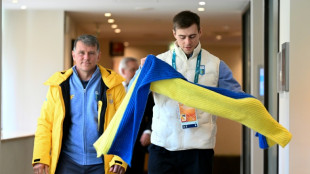
-
 A Friday night concert in Kyiv to 'warm souls'
A Friday night concert in Kyiv to 'warm souls'
-
PSG stunned by rampant Rennes, giving Lens chance to move top

-
 Japan's Totsuka wins Olympic halfpipe thriller as James misses out on gold
Japan's Totsuka wins Olympic halfpipe thriller as James misses out on gold
-
Indian writer Roy pulls out of Berlin Film Festival over Gaza row

-
 Conflicts turning on civilians, warns Red Cross chief
Conflicts turning on civilians, warns Red Cross chief
-
Europe calls for US reset at security talks

-
 Peru leader under investigation for influence peddling
Peru leader under investigation for influence peddling
-
Rising star Mboko sets up Qatar Open final against Muchova

-
 Canada PM to mourn with grieving town, new details emerge on shooter
Canada PM to mourn with grieving town, new details emerge on shooter
-
US waives Venezuela oil sanctions as Trump says expects to visit

-
 NBA star Chris Paul retires at age 40 after 21 seasons
NBA star Chris Paul retires at age 40 after 21 seasons
-
WTO chief urges China to shift on trade surplus

-
 Vonn hoping to return to USA after fourth surgery on broken leg
Vonn hoping to return to USA after fourth surgery on broken leg
-
Trump sending second aircraft carrier to pile pressure on Iran

-
 Heraskevych loses Olympics disqualification appeal, Malinin eyes second gold
Heraskevych loses Olympics disqualification appeal, Malinin eyes second gold
-
Mercedes have 'taken a step back': Russell

-
 Madagascar cyclone death toll rises to 40, water, power still out
Madagascar cyclone death toll rises to 40, water, power still out
-
Earl says England inspired by last year's Calcutta Cup

-
 USA romp past Dutch in T20 World Cup to keep Super Eight hopes alive
USA romp past Dutch in T20 World Cup to keep Super Eight hopes alive
-
De Minaur scraps past local legend van de Zandschulp

-
 Ukrainian Heraskevych loses appeal against Olympics disqualification
Ukrainian Heraskevych loses appeal against Olympics disqualification
-
Ghana rallies round traditional tunic after foreign mockery

-
 Forest set to hire former Wolves boss Pereira: reports
Forest set to hire former Wolves boss Pereira: reports
-
England rugby captain Itoje slams Ratcliffe's 'ridiculous' immigration comments

-
 Europe should speak to Russia with 'one voice', Putin foe says
Europe should speak to Russia with 'one voice', Putin foe says
-
US Congress impasse over immigration set to trigger partial shutdown

-
 US to deploy new aircraft carrier to Middle East as Trump warns Iran
US to deploy new aircraft carrier to Middle East as Trump warns Iran
-
Ubisoft targets new decade of 'Rainbow 6' with China expansion

-
 Stocks trend lower as AI disruption worries move to fore
Stocks trend lower as AI disruption worries move to fore
-
Spurs set to hire Tudor as interim boss until end of season: reports

-
 International crew en route to space station
International crew en route to space station
-
Man City's Rodri charged over ref rant

-
 Italian biathlete Passler cleared to compete at Olympics despite positive test
Italian biathlete Passler cleared to compete at Olympics despite positive test
-
Macron slams 'antisemitic hydra' as he honours 2006 Jewish murder victim

-
 Tuipulotu warns England to beware 'desperate' Scotland in Six Nations
Tuipulotu warns England to beware 'desperate' Scotland in Six Nations
-
Cash-starved French hospitals ask public to pitch in

-
 US consumer inflation eases more than expected to lowest since May
US consumer inflation eases more than expected to lowest since May
-
Germany's Merz urges US to repair ties with Europe

-
 Europe seeks new 'partnership' with US at security gathering
Europe seeks new 'partnership' with US at security gathering
-
Fresh water leak adds to Louvre museum woes

-
 Floods wreak havoc in Morocco farmlands after severe drought
Floods wreak havoc in Morocco farmlands after severe drought
-
Russia, Ukraine to hold talks in Geneva on February 17-18

-
 Ukraine's Heraskevych hopes 'truth will prevail' in Olympics appeal
Ukraine's Heraskevych hopes 'truth will prevail' in Olympics appeal
-
Dumplings and work stress as Chinese rush home for Lunar New Year

-
 Macron denounces 'antisemitic hydra' as he honours 2006 Jewish murder victim
Macron denounces 'antisemitic hydra' as he honours 2006 Jewish murder victim
-
India-Pakistan: Hottest ticket in cricket sparks T20 World Cup fever

-
 Cross-country king Klaebo equals Winter Olympics record with eighth gold
Cross-country king Klaebo equals Winter Olympics record with eighth gold
-
Ukraine's Heraskevych appeals to CAS over Olympic ban as Malinin eyes second gold

-
 Stocks mostly drop after Wall Street slide
Stocks mostly drop after Wall Street slide
-
Sophie Adenot, the second French woman to fly to space


Why Greeks still love their smashing nights out
A Greek crooner is showered in red and pink carnations by customers in an Athens taverna as they sway to his songs of love and passion.
But suddenly the flower-throwing of fans in high heels and sparkly lame outfits gives way to a wild crescendo of plate smashing.
Piles of crockery are broken at the singer's feet -- a decades-old tradition of late-night folk revelry that has survived dictatorship, the Greek debt crisis and now Covid.
"The Greek mentality is different from that of foreigners. When it comes to entertainment... you have to have a lot of noise," said Christos Gounaris, who manages singers on the Athens folk scene.
It is the night of the Epiphany, a major religious holiday in Greece, and large tables are set out in front of the stage of the tavern in Peristeri in the working-class west of Athens.
Late-night bouzouki taverns like this named after the lute-like instrument originally brought over by Greek refugees from what is now modern Turkey in the 1920s.
The singer in the leopard-print shirt bringing the place to its feet is Pavlos Spiropoulos, who drives a truck during the week and sings long, tragic love songs at the weekend.
"When people throw plates and flowers at me I feel happy, because I feel I'm doing a good job and that the public loves me," said the 51-year-old, who has been singing since the age of 18.
- 'Let off steam' -
Breaking plates "is a way for customers to let off steam", adds the tavern's 56-year-old owner Vassilis Miggas.
"It's also a way to show the singers: 'You're good, I like that!'" he told AFP.
"We throw flowers and plates for those who put the most passion" into their performance, said Gounaris.
Plates are also broken at weddings to bring good luck to the bride and groom, or at christenings.
For some, breaking plates and throwing flowers is a way of showing wealth and social status. But now they are often included in the bill, costing the owners three euros or so a dozen before tax.
The practice reached its zenith in the 1960s, its popularity bolstered by appearances in iconic films such as "Never on Sunday" starring legendary Greek actress Melina Mercouri, with its theme song winning an Oscar in 1961.
At the time, 100,000 plates were broken every month and dozens of small companies sprang up to mass produce the made-to-break crockery, according to the Piata yia spasimo company, whose name means "Plates for smashing".
Based in nearby Piraeus, the family-run company, founded over 40 years ago, is one of the very last still making these plaster plates.
There is no definitive theory on the origins of the custom.
Gounaris said it evolved in the 1930s out of a previous tradition of knife-throwing.
"But people got hurt," he said, with patrons then throwing balloons and chocolates before settling on plates.
- 'We forget our problems' -
Today the tradition is also a draw for tourists in some of the taverns in Athens's historic district of Plaka, or on islands popular with revellers such as Mykonos.
But it has also clung on among Greeks, weathering the ups and downs of the country's history even if it has lost some of its popularity amid safety concerns for artists.
Banned by the military dictatorship that seized power in 1967, Greeks started smashing plates again as soon as democracy was restored in 1974.
The squeeze on incomes during the near-decade-long Greek debt crisis was a blow, as was the Covid pandemic that forced restaurants, bars and entertainment venues to close for months.
But Spiropoulos is not worried.
"We're full (tonight)," he said.
In Greece "we drink, we go out to forget our problems!" he shouted.
L.Mason--AMWN

